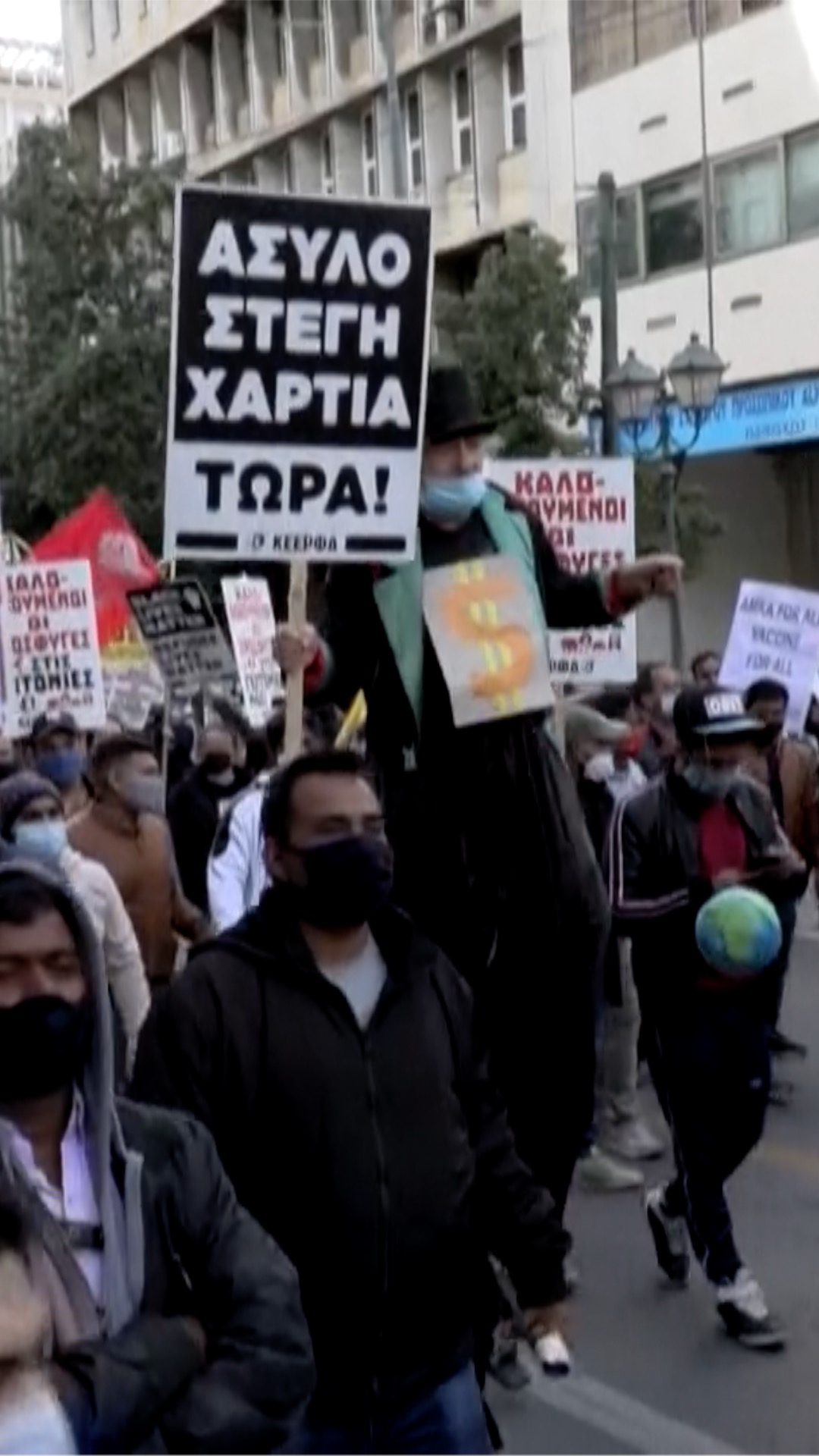01:11

The Greek government has renewed demands for Turkey to take back 1,450 migrants currently held in reception centers.
Migration minister Notis Mitarachi's comments came as hundreds of anti-racism campaigners demonstrated in Athens, with many calling for refugees to be allowed to stay in Greece.
Greece has faced persistent allegations of migrant pushbacks in Aegean waters.
Mitarachi told AFP that Turkey must demonstrate its "willingness to cooperate" with the EU on a controversial 2016 deal in which Ankara is paid to stem the flows of would-be refugees, primarily from Syria.
The accord arranged for payments of $7.1 billion to Turkey to stop asylum seekers from crossing to Bulgaria and Greece. The European Commission says $4.8 billion has already been delivered, with the remaining amount contracted to projects supporting refugees.
Ankara says that only $4.3 billion has been received, and stresses that Turkey has 3.7 million Syrian refugees on its soil.
Since the deal, which allows Greece to send back asylum seekers arriving via Turkey, the number of migrants and refugees arriving has plummeted from 856,000 to just 10,000.
Mitarachi denied accusations that his government has authorized the turnaround of boats in Greek waters. "We haven't returned boats," he said. "We have prevented boats from entering European and Greek territory, but this is something allowed by the regulations."
On Friday Berlin-based campaign group Mare Liberum said it had documented 321 incidents from March to December 2020 in which more than 9,000 people "were violently pushed back to Turkey and thus deprived of their right to asylum."
So-called 'pushbacks' prevent asylum-seekers from making refugee claims and, if practiced indiscriminately, constitute a violation of core EU human rights laws and the 1951 Geneva Convention. A recent investigation by EU border agency Frontex into the allegations proved inconclusive.

Mitarachi says Turkey must demonstrate its "willingness to cooperate" with the EU on 2016 refugee deal. /Angelos Tzortzinis/AFP
Mitarachi says Turkey must demonstrate its "willingness to cooperate" with the EU on 2016 refugee deal. /Angelos Tzortzinis/AFP
After a two-day Athens summit on a new European Union migration pact, Greece, Cyprus, Italy, Malta and Spain on Saturday urged other EU states to share the migration burden. The countries have already told the European Commission that its proposed New Pact on Migration and Asylum fails to share fairly the burden of migrants arriving in Europe.
"We repeat our strong plea in favor of a true balance between solidarity and responsibility," the common statement read. "In its current format the Pact does not provide sufficient reassurances to the front-line Member States."
Mitarachi warned that "the pact shouldn't allow in future the emergence of new camps like Moria," referring to the Greek island refugee camp on the island of Lesbos destroyed by fire.
He added that "there is a lack of balance between the obligations of the countries of first reception and the uncertain mechanism of solidarity of the rest of the EU."
Lesbos currently houses at least 8,500 asylum seekers, most living in a temporary tent camp.
Protesters marched through Athens, and other Greek cities, on Saturday in support of migrants and refugees.
Organizer Petros Constantinou told reporters: "We want the European Union to stop the policy of deportation, to end the agreement with Turkey. It is necessary to open the borders because we don't want to see women and children drowned in the Mediterranean Sea."
The talks occurred ahead of this week's two-day EU summit focusing on EU-Turkey relations, which begins on Thursday. Much is at stake.
EU chiefs on Friday pressed Turkish President Recep Tayyip Erdogan for a "sustained de-escalation" as the neighbors seek to improve diplomacy after rising tensions in the eastern Mediterranean. The bloc has been encouraged by Turkey resuming talks with Greece over their disputed maritime border and by plans to restart UN peace efforts for divided EU member state Cyprus.

